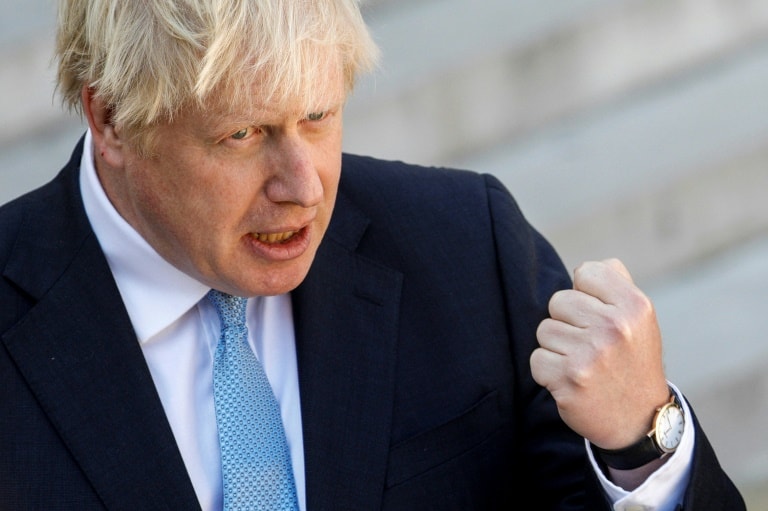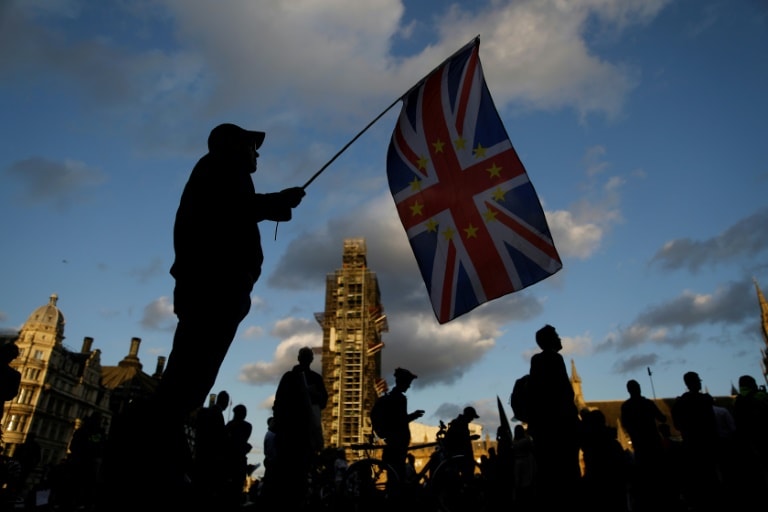When the Brexit 'captain' runs out of ideas
(Baonghean) - Boris Johnson has only been British Prime Minister for 7 weeks, but it seems that this politician's pool of ideas about Brexit has already been exhausted.
After lawmakers rejected the Downing Street boss's second attempt to call an early election to resolve the Brexit impasse, Johnson is now limping towards a crucial EU summit next month, just days before Brexit is scheduled to end.
Failure after failure
On the night of September 9, Mr. Johnson decided to suspend the activities of Parliament. The move was made after an unpleasant evening, when his government lost 2 votes in parliament, "contributing" to the 4 seats lost last week.
In parallel with rejecting the Prime Minister's move to hold an early general election, the British Parliament earlier this week also forced Johnson's senior aides to reveal private communications on all issues related to the suspension of Parliament.
 |
| Boris Johnson is at risk of becoming Britain's shortest-serving prime minister. Photo: AFP |
According to some analysts, this does not affect British politics much, but it marks another humiliating defeat for a brand new leader.
Last week, lawmakers took control of the parliamentary process from Mr Johnson's government and passed a bill that would force the prime minister to ask the European Union (EU) for a Brexit extension.
This, in theory, would rule out the possibility of a “hard” Brexit, meaning no deal, on October 31. Finally, among the options put forward in parliament, where Mr Johnson has lost his majority, he has once again tried and failed to call an early election.
According to CNN, the British Prime Minister's suspension of Parliament comes at a crucial time in the Brexit process and has created some "crazy" days in less than a month.
Parliament will return on October 14, after the major parties have held their annual conferences. Three days later, the other 27 EU members will meet for a summit in Brussels, Belgium.
This is where any extension or change to the Brexit deal, if any, will take place. If Johnson is agreed to give him a new deal – which he has insisted is his government’s primary objective – he will have just two weeks to get it through Parliament.
This option does not seem very promising, because the terms that Mr. Johnson proposed for the new agreement broke the "red line" on Brexit that the EU had drawn.
 |
| Britain must leave the EU on October 31, whether or not it reaches a divorce deal with Brussels. Photo: AFP |
The EU's view that Britain has not yet proposed viable alternatives to the Brexit deal was once again emphasised by Irish leader Leo Varadkar when he told reporters standing next to Mr Johnson on 9 September in Dublin:
“We are open to alternatives. But they must be realistic, legally binding and achievable. To date, we have not received any such proposals.”
What scenario for Johnson?
There are three possible scenarios in the current context, but it should be noted that each scenario would lead to chaos and confusion in the capital of London.
First, Prime Minister Johnson could follow the law passed by Parliament last week and request a delay to Brexit. The EU could accept this request, and temporarily avoid the prospect of a “no deal”. Then, when everyone “takes a breather”, things will get complicated.
The EU, and France in particular, have made it clear that a third extension will only be granted if there are fundamental changes in the UK's political calculus.
In practice, radical change would mean holding elections, which the opposition would be less likely to oppose at that stage, given that a hard Brexit is temporarily off the table.
But this also means that an extension will only be approved on the condition that an election is certain to take place.
The second option would see the EU reject Johnson’s extension request. He would return to London facing two choices: revive former Prime Minister Theresa May’s thrice-defeated Brexit deal or accept no deal as the default.
This would lead to two weeks of chaos, as the opposition seeks to force a general election by calling a vote of no confidence in Mr Johnson's government.
The third option is similar to the second, but with a slightly more legal complication. If Johnson refuses to extend the mandate, he will be ignoring a legal requirement. He could then face impeachment or, worse, imprisonment.
CNN commented that there is no doubt that this "designed" level of chaos, which will gradually decrease as the Brexit deadline of October 31 approaches, is a deliberate move by the British government.
 |
| EU leaders have accused Johnson's government of failing to come up with concrete alternative Brexit plans. Photo: AFP |
Mr Johnson's close advisers have made no secret of their belief that the British Parliament is actively ignoring the will of the people on Brexit and is only interested in engaging in debates with the public.
Johnson wants an early election because he believes his “do or die” Brexit plan will give him a majority in Parliament. That is why he is trying to get the vote through Parliament on the night of 9 September.
Now that his request has been rejected, Johnson finds himself with little choice. Caught in a legal and constitutional web, the British Prime Minister has suspended Parliament and withdrawn support for his opponents by stripping them of the last thing he has power over – parliamentary time.
It was a risky move, but desperate times call for extreme measures. And if Johnson's last resort fails, there may be only one move left for the leader: to recall Parliament and call a vote of confidence in himself.

